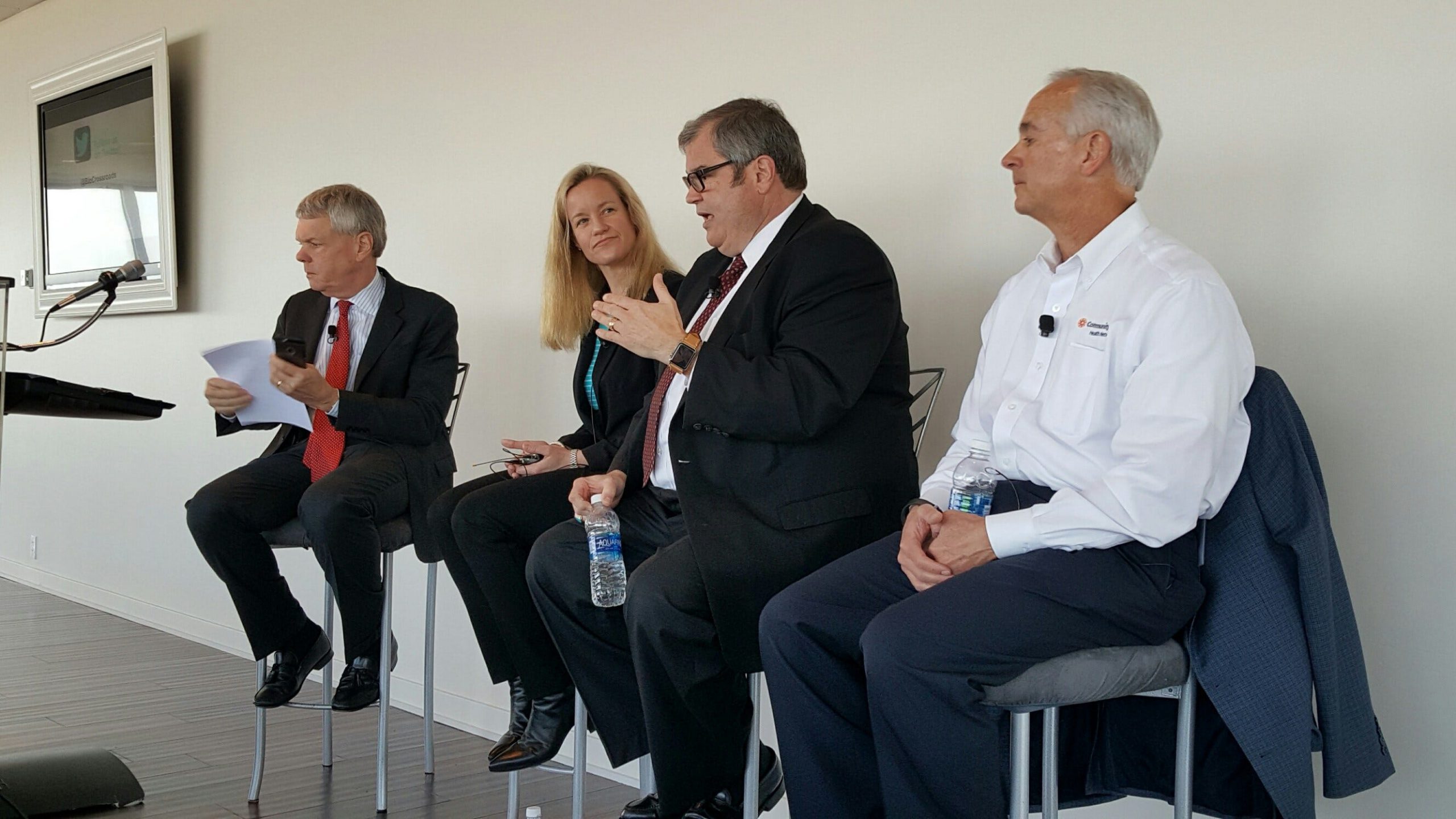Leaders Issue ‘Wakeup Call’ for Businesses to Battle Poor Health
 David Johnson
David Johnson
Subscriber Benefit
As a subscriber you can listen to articles at work, in the car, or while you work out. Subscribe NowBusiness and public health leaders are sounding the alarm and issuing a battle cry to address Indiana’s poor health. The strategy calls for the private sector to have a reality check of sorts and help lead the charge in improving Hoosiers’ health. Indiana’s challenges loom large: United Health Foundation’s America’s Health Rankings shows Indiana is 39th in overall health, and a Gallup study ranks the state 47th in well-being. While public policy plays a role in digging Indiana out of its health hole, business leaders are telling others in the private sector to stop presuming it’s not their problem.
“A message we want to give employers is our economic progress will be limited by our poor health,” says David Johnson, president and chief executive officer of the state’s life sciences initiative BioCrossroads. “Our ability to continue to advance will be restricted by the fact that we will not have the productive employees and the activity in the economy to make it happen. It’s not only a social and moral imperative, it’s an economic imperative to deal with these issues.”
IU Richard M. Fairbanks School of Public Health Founding Dean and Professor Dr. Paul Halverson says the health disparity within a 28-mile stretch in Indiana is “worlds apart.” Life expectancy in the Indianapolis suburb of Carmel is 83 years—equal to Japan and Switzerland—but the urban center of Indianapolis is 14 years less at 69, on par with Uzebekistan and Bangladesh.
“Employers, as they look to find a community to build a plant in or bring their business to, they’re increasingly looking carefully at the health care costs in the community and the overall healthiness of the community,” says Halverson. “And unfortunately, when you look at Indiana, we’re wanting in many areas.”
And Indiana’s health has been on a rapid decline; Halverson says, in 1996, the state ranked just slightly below average. He emphasizes today’s poor health statistics are a symptom of funding; Indiana ranks 49th in public health funding.
“If we think about how we fund things as a function of our value system, it says that, for a long time, we haven’t valued health in our community,” says Halverson. “We fund it miserably, and we don’t really pay much attention to health policy issues that make the greatest impact. We have to have a wakeup call to say it’s time that we begin to address this.”
Rallying efforts to improve Indiana’s population health was the focus at a recent Frameworx event, hosted by BioCrossroads. Private and public health leaders agree tobacco use is Indiana’s greatest—and most costly—health challenge and should be the key target to “move the needle” in Indiana. Data shows smoking causes some of the most deadly and costly diseases, including cancer, heart disease and emphysema.
“For us to truly make a difference on all these [poor health rankings], we need to unite,” says Community Health Network Chief Executive Officer Bryan Mills. “The easiest way to do it is on this tobacco piece, but [private companies] can’t do this on our own. We need the legislature to work in partnership with us. We keep looking for a united front to make that happen.”
Public health experts say a large body of scientific evidence shows raising the price of tobacco products decreases smoking, but the 2017 Indiana General Assembly failed to pass a proposed cigarette tax increase. Public health leaders are, instead, pushing employers to take action within their companies; they say insurance coverage that includes tobacco cessation programs, financial incentives to quit smoking and enacting smoke-free policies in the workplace are all proven strategies.
A second critical concern in Indiana is opioid abuse; the state ranks 35th in drug deaths, and death by drug overdose has increased 500 percent since 1999. Richard M. Fairbanks Foundation Inc. President and Chief Executive Officer Claire Fiddian-Green says, in a recent survey, 80 percent of employers in Indiana say they have observed prescription drug misuse by their employees.
The Indianapolis-based foundation recently awarded a $376,000 grant to Ascend Indiana, a workforce development initiative of the Central Indiana Corporate Partnership, to address “the massive shortage” of addiction specialists in Indiana.
“We looked at the data, and we saw there was a supply gap in terms of the number of people trained in the health professions to treat patients struggling with addiction,” says Fiddian-Green. “The grant will design a scalable program that will be implemented at Community Health, and afterwards, could be scaled across other health systems, so we could have many more health professionals trained in addictions to provide treatment to patients across Indiana.”
Calling on the private sector to stop “presuming that’s just the way things are,” Mills is among a group of high-ranking executives calling on other Hoosier companies to put more skin in the game.
“It’s unfortunate that, in Indiana, we haven’t paid enough attention to the things that really matter when it comes to our health,” says Halverson. “If you look at the workplace, this is where people spend most of their time. So why wouldn’t we want to invest in our employees, who are our greatest asset, so they’re not only healthy, but happy and productive? It’s time to starting thinking beyond the traditional ideas.”
Fiddian-Green says tobacco use impacts an employers’ bottom line, but “we know what works” to address the problem.
Mills says employers need to get involved for two key reasons.
Halverson says scientific evidence shows that encouraging employees and their family members covered under company insurance programs to quit smoking reduces costs substantially.
